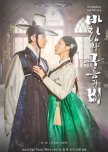Deze recentie kan spoilers bevatten
Joseon's last days
This was a great telling of the factors leading to the decline of a 500-yrs old dynasty. Was it 100% accurate historically? No, but that's why it's a fictionalized account, not a documentary. I was delighted that this centered on history with a love story woven in, rather than a love story with a historical backdrop. This one had me researching Korean history after each episode.
Fair treatment was given to the main players at that time, and very few were portrayed as "all good" or "all bad." Actual power resided in certain noble families, so family connection trumped capability and family interest trumped national interest. Jockeying for positions of power- Kim versus Jo, insider versus outsider- lies at the heart of this series. The means used to obtain that power were explicit, and clearly showed that at the end of the day, the welfare of a nation was secondary to the elites. Heungseon may have wanted to destroy the factional powers for a centralized government, but his own ambitions proved to be just as harmful to the people. Queen Min may have had a heart for the people, but her desire to topple her father-in-law to replace with her own influence, would add burdens on them. And hapless Gojong, as sad a figure in this series as he was in actuality.
Despite all this, the message I got was one of hope for the future of the Korean people. The foundations being laid to put value on a person's talents rather than geneology, value on education for all citizens, and value on being open to new ideas, as well as the idea of redemption, would see Korea through the years of darkness until her liberation in 1945. Sadly, the same issues that led to a divided Germany divided Korea in half. My hope is one day Korea, like Germany, will be united again.
The cast was amazing. Park Shi Hoo played Choi Chun Joong to perfection- inscrutable but with passion just below the surface. Jun Kwang Ryul was frightening with his changing persona. And Im Hyun Soo as Yeon Chi Sung made my heart ache for his utter devotion to any one who showed him he was valued.
Fair treatment was given to the main players at that time, and very few were portrayed as "all good" or "all bad." Actual power resided in certain noble families, so family connection trumped capability and family interest trumped national interest. Jockeying for positions of power- Kim versus Jo, insider versus outsider- lies at the heart of this series. The means used to obtain that power were explicit, and clearly showed that at the end of the day, the welfare of a nation was secondary to the elites. Heungseon may have wanted to destroy the factional powers for a centralized government, but his own ambitions proved to be just as harmful to the people. Queen Min may have had a heart for the people, but her desire to topple her father-in-law to replace with her own influence, would add burdens on them. And hapless Gojong, as sad a figure in this series as he was in actuality.
Despite all this, the message I got was one of hope for the future of the Korean people. The foundations being laid to put value on a person's talents rather than geneology, value on education for all citizens, and value on being open to new ideas, as well as the idea of redemption, would see Korea through the years of darkness until her liberation in 1945. Sadly, the same issues that led to a divided Germany divided Korea in half. My hope is one day Korea, like Germany, will be united again.
The cast was amazing. Park Shi Hoo played Choi Chun Joong to perfection- inscrutable but with passion just below the surface. Jun Kwang Ryul was frightening with his changing persona. And Im Hyun Soo as Yeon Chi Sung made my heart ache for his utter devotion to any one who showed him he was valued.
Vond je deze recentie nuttig?




